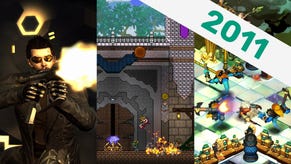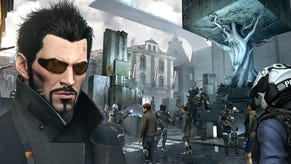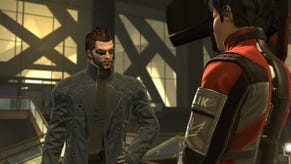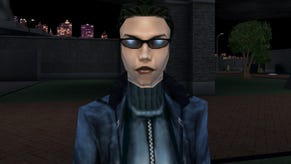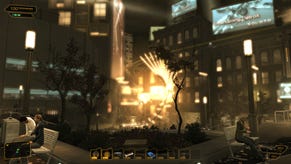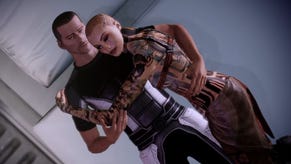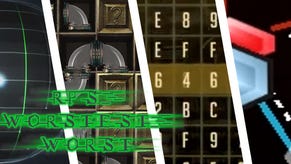Deus Ex 3: Jean-François Dugas Interview
Staying calm the face of a new Deus Ex game is tricky. Quintin came back from GamesCom making excited chirping noises, but there's so much at stake. We must remain steady until we're certain. We'll play it and then, only then, we'll decide whether to get to explode in a ticker-tape parade of giddiness. Of course, this steely focus didn't stop me getting in touch with the lead designer, Jean-François Dugas, and seeing what he had to say about the game. Fortunately for us he said many things, including revealing the link with Rainbow Six: Vegas, and explaining that most of the game could be played through without killing anyone. Also, most significantly, we can exclusively reveal that there are no greasels in Human Revolution.
Read the full conversation below.
RPS: So let's start with some background. How did you come to be designing the third Deus Ex game?
Dugas: My background, okay! I started in the industry in '97. I started off working on racing games on the N64 and PS1, things like that, then I moved over to first-person games, such as the Far Cry games, and an unannounced Rainbow Six game. At some point I was approached by a producer I had worked with in the past, and he asked me “would you be interested in making the next Deus Ex game?” I basically said yes, but with my heart pounding! It actually took me about six weeks to say yes. So that's how it came about. I was approached, and I was a fan, and so it was a really, really exciting moment.
RPS: You were nervous about it?
Dugas: Well, I already had a project, a good small team, a good position. I was happy there. When you work somewhere and you have to make a big change you have to know what is going to await you. The primary reason I said yes was because it was Deus Ex, but I was already working, so I had to take these things into consideration.
RPS: What did the original game mean to you?
Dugas: To me Deus Ex 1 was... well, it was ground-breaking. For me, it was a game that made me feel clever, because of the way I was playing around with the tools that you have available to you. That was pretty satisfying. It wasn't the first game to do these kinds of things, I would say, but it was one of the first where that particular sense of achievement was more up front. One of the important things at that time, one of the things that stuck with me, was the fact that the game would reflect your actions. So depending on how you acted different characters would say different things to you. For me that resonated, because I did not feel like a ghost in the game, I was a part of it. That was a super-strong aspect of the game, and important.

RPS: Something that comes up when we talk about Deus Ex is that if Invisible War hadn't had the Deus Ex name attached, it might not have been judged so harshly. But it was also the point at which that kind of game was being attempted for consoles, which makes it interesting, and possibly relevant to you?
Dugas: Before we really started designed Deus Ex: Human Revolution we went back to the first two games and played them again. Even though the second one hadn't been so well received, it was important to go back and see what they had done. We also had to go back to the original game, because you might not have played a game like that for years and you end up with souvenir memories of everything. Playing it again now enables you to step back and look at what is strong and what is not as strong. For me it was essential to go back to those games and try to understand what were the pillars of the franchise, what were the core values. We had to make sure that we designed within the confine of those values. It doesn't mean that it's the same as DX1 or DX2, but the same ideals and values are portrayed in Deus Ex: Human Revolution. That said, our game is based more on Deus Ex 1 because the more RPG aspect is stronger. The way things are used, the feature list, that is stronger. But overall it was about understanding the values across both games. We wanted to revive it for a third game, understanding the franchise through both earlier games was the best way to do that.
RPS: These are not the only games that have influenced you for this project though, are they? I have seen you mention the cover system in Rainbow Six: Vegas, which you also worked on, as being important to DX3? Splinter Cell seems to flicker in and out there, too...
Dugas: Well we have not /just/ been influenced by games, of course. In recent years there have been games like Fallout 3 and Bioshock, we definitely looked at those, because I think they were able to maintain complexity in game that is also on console. We might think that console needs to be dumbed down, played with one button or whatever, and I think those games are an example of maintaining some level of complexity, and for us that was useful. One thing we wanted to make sure was that weren't sacrificing the complexity of the Deus Ex experience because the game is on console. Seeing how these games have tried to do that is useful to us.
But we also have looked at books and movies, sci-fi movies old ones and new ones: Bladerunner, Robocop, The Matrix and also some Japanese Anime. We went all over the place to see where something would strike us as really cool. We didn't want to really reproduce what anything else did, of course, but to create our own package that seems unique, seems fresh. You can see some influences of these things, I would say, but you cannot say that we rip them off.

RPS: Going back to what you were saying about core values, it struck me playing DX again recently, as well as System Shock and Thief, that all those games basically leave you feeling pretty vulnerable. You have to run away from multiple adversaries, have to hide, and so on. Will Human Revolution have a similar sense of threat to your character?
Dugas: At the beginning you don't have much augmentation, so you aren't that strong. But as you progress and explore some of the areas off the critical path, then you will start to beef up your character. You will not be invincible at all, at any stage, but at the end of the game you will probably be more like Robocop than a human being.
Right now we are balancing the game, I was playing with the new tweaks this week, and if there are more than two or three enemies on screen you will go down fast, especially if you don't pay attention to your surroundings. We're aiming to make the frontal assault approach a possibility, like any other means in the game, such as hacking or whatnot, but the frontal approach will require some thinking. If you want to play it as Serious Sam you might not find this to be the game you are looking for.
RPS: Can you talk about the stealth mechanism? Hiding in shadows? Line of sight?
Dugas: It is really not very complicated, it's quite a simple system in that you refer to the cover around you, but what you are trying to do is break line of sight and manage the amount of noise you produce. And why we decided to go that way – since we knew that our game would not be built with light and shadows, we would have some brighter, lit environments, basing it on shadows would have been even more complicated. Going with breaking the line of sight and sound produced means you could play stealth in a well lit area. It was about making that stealth work for the player without breaking either the game or the visuals we wanted to produce.
For the cover system, well, I don't know if you played Rainbow Six: Vegas, but it is similar: there is no automatic cover, if you don't hold the button then you are not going into cover, release it and you go out from cover. It's very simple, very natural, and it gives you a good sense of what is going on in the environment to help you plan your next move. Of course if you wanted to just stay in first-person you can do that. There's no mechanic tied to the cover, especially for stealth, it is not tied to the cover mechanism.

RPS: So what is the reasoning behind the third person sequences? I mean, you see your DX1 character in the third person for dialogue, but here it's for action bits too. Not just the cover use, but things like the bombs being thrown out, takedowns, and so on. What's the idea behind that?
Dugas: There are a few reasons behind that. When we started the project we realised that the main character should be an important character in that sense that you should know or be compelled to know who he is, what his background is, but also that it shows what his augmentations are. We wanted it to feel cinematic. We didn't want it to simply be some stats that tell you that you are better at this or that, without you feeling directly the sense of reward. We wanted to make sure that the more physical augmentations would be more impactful, and we should be able to see that on the character as often as possible, while maintain a first-person game. This means you get to see your character for certain actions, use of certain items, climbing a ladder, things like that.
RPS: Speaking of augmentations, there seems to be quite a lot of future-fantasy tech going on. Is that going to extend into weapons, which have so far been sniper rifle, assault rifle, stabby blade thing. Any other surprises there?
Dugas: Yes, we didn't reveal that much so far. We revealed a few weapons at E3 and GamesCom, but we have others. We have lethal and non-lethal varieties, and some are more futuristic and experimental than others. We wanted to make a distinction between the more real-world, familiar weapons and the more experimental things we haven't talked much about yet. The marketing guys will tell us when it's time to talk about that!

RPS: So with non-lethal weapons, is that going to be central to the game? Is there going to be some hiding of unconscious bodies and so on?
Dugas: Absolutely. If we make an exception for a few forced encounters, you can play the entire game without killing anyone. Or if you decide to kill them all, that's up to you. With the non-lethal weapons, if you don't hide the bodies, you will find another guard will come round, and wake his friend and they will come and look for you. It's not always necessary, because some enemies will be alone and isolated, but it's about managing risk. You will want to drag bodies into cover.
RPS: Okay, this is a bit of an odd question. In DX one there were mutant animals. The greasels, and some kind of crocodile thing. Are there going to be any mutant animals in Human Revolution?
Dugas: Uh, no.
RPS: Good, I hated those things.
Dugas: [Puzzled laugh.]
RPS: Moving on: the augmentation system. What sort of limitations are there? Will I have a single specialisation by the end of the game? Mix/max style?
Dugas: With the augmentation system there are four pillars: combat and stealth, hacking and social. Combat and stealth are primary modes, so all missions can be completed with either combat or stealth approaches. Hacking and social are secondary modes which support the primary modes and exploration in general. There might not always be a social or hacking alternative to a problem, but there will always be a solution through the primary pillars of the game, through combat or stealth.
Our goal right now is to make sure that, in a single play-through, you can't have it all. So you will have to choose whether to go more with combat, or more with stealth, or to balance them both. You will have to decide which kind of augmentations you want to push, or not. You will have to decide what kind of player you are. Will you be John Rambo with all combat boosted? Or will you be a Jack of all trades? It's about how you want to play the game. You will acquire experience points from doing missions and these can be used to unlock new abilities. Some of these are already present but must be learned. At the beginning of the game you might have the augmentations in your body, but you might not have all the abilities. Your brain needs to adapt to the machinery. We also have “softwares” which allow you to learn these things faster, a little like the cannisters in DX1.

RPS: Okay, let's talk size and linearity. How open are the levels going to be? It was one of the strengths of DX1, to my mind, that you could find your own route through a number of the levels...
Dugas: It's going to be a mix of open spaces and more confined spaces. If you have seen the E3 and GamesCom demo? Well, the E3 demo was just one corner of a street, and it is way bigger than that. It goes off a long way in several directions, and you can explore all that. But there are also missions where we go behind enemy lines, and they are more comparable with say Area 51 if I can compare that with the original Deus Ex game.
So we will have city areas which you will have to explore, and within those there will be interiors you will have to storm, and then you will fly off to another locations where things are more constrained. It's back and forth. The story is linear in that you reveal one layer at a time, but the choices that you make within that will reveal the story here and there, explore this and that. The game will tell you when it is time to go into a compound or whatever. It's a linear structure with many possibilities within the structure.
RPS: Finally, Deus Ex was quite a political, philosophical game. It was filled with ideologies and tried to deal with them in game form. What are you dealing, or trying to deal with, in Human Revolution?
Dugas: We have a few themes. Transhumanism is at the heart of the experience. We are asking the question about our own evolution, and asking whether we should go there. Is it good for humanity or not? These changes are important, and real.
But one of the end goals we were interested in exploring was the human factor. Why do people do what they do? Characters in the game believe in something, so what is the factor behind their reasoning? We wanted to give a human element to it, to explore the reasons behind their actions. In real life we will demonise people because their beliefs are not matching ours, but when you try to understand those people you see that they simply come from a different background, a different life. That's what we're trying to tackle in Human Revolution, to give a third dimension to the machinations of our characters and not just say “Bwha, I am evil because I like to do this kind of thing!”
RPS: Thanks for your time.
Deus Ex 3 is scheduled for February 2011.


